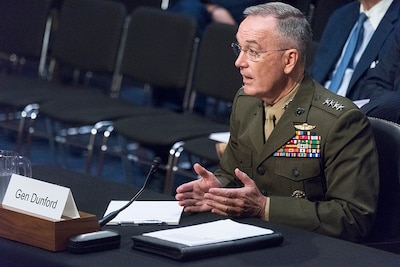By Jim Garamone DoD News, Defense Media Activity
WASHINGTON, Sept. 26, 2017 — The erosion of American
military capabilities is real and must be halted, the chairman of the Joint
Chiefs of Staff told the Senate Armed Services Committee here today.
Marine Corps Gen. Joe Dunford asked members of the committee
to provide adequate, stable budgets so that the Defense Department can fight
today’s battles, and prepare tomorrow’s force.
Dunford attended his reconfirmation hearing in the U.S.
Senate Hart Building. He has served as CJCS since Oct. 1, 2015, and has been
nominated for a second two-year term.
The chairman told the senators that America’s military
benchmarks its forces’ capabilities against the military capabilities of Russia
and China.
Russia and China are spending vast amounts to build up their
militaries and they are aiming capabilities at American gaps, Dunford said. The
biggest advantage the United States maintains, he said, is the ability to
deploy troops and capabilities anywhere in the world and then maintain them.
Russia and China, he added, are looking to minimize that advantage and split
the United States from its European and Pacific allies.
Since World War II, the United States thinks and acts
globally, Dunford said.
In the early part of this century, the United States “had a
significant competitive advantage in our ability to project power when and
where needed to advance our national interest,” he said.
“I can't say that today,” the chairman said.
Capabilities are also eroded by lack of money and lack of
time for training, he said.
“If you took a pilot specifically, you know, in the past,
pilots might have had 30 hours a month to fly. Now they may be down as low as
15 hours a month,” Dunford said. “On a day-to-day basis, you may not be able to
see the different between pilot A and pilot B. But, if there is an in-flight
emergency, I can guarantee you that the pilot that has 30 hours will
immediately feel much more comfortable and confident in their ability to deal
an anomalous situation [and] be able to control their physiological response.
And you and I may never find out about that incident.”
The pilot with only 15 hours a month may not end up so safe,
the chairman said.
“I would argue that, while we may have trained to standard
in the past, when we had sufficient time and resources, now, we're training to
time, because that ship is going to go to sea, that pilot is going to go to
war, that infantryman is going to go to war, whether or not they've had an
opportunity to train, sometimes, in the basic tasks or not,” he said.

No comments:
Post a Comment